Through carols, cookies and Christmas lights, December 25 is marked by jubilation and celebration of the birth of Jesus for more than 2 billion Christians worldwide.
Thank you for reading this post, don't forget to subscribe!However, a silent night falls on the 50,000 Christians in Palestine – a number that is in rapid decline.
The safety of Christians in Palestine was shaken by the bombardment of Gaza’s oldest Greek Orthodox Church of Saint Porphyrius in October, which killed at least 18 people including children. Israeli forces also shot and killed an elderly Christian mother and her daughter in a Catholic church in Gaza on Saturday.
This year, the many gleeful rituals that characterise Christmas in Palestine will be replaced by simpler ceremonies, mourning and prayer, shining a harsh light on the current reality of the region. The Lutheran Church, for instance, has the Baby Jesus in a manger of rubble and destruction.
Was Jesus Palestinian?
Many Christian schools of thought believe that Jesus was born in Bethlehem, in the now Israeli-occupied West Bank.
“Jesus was born on our side of the wall,” Palestinian pastor Reverend Munther Isaac told Al Jazeera.
Isaac added that the narrative of the birth of Jesus in Bethlehem is backed by archaeology as well as scripture such as Luke’s Gospel.
“It’s the year 2023, and you’ve got, on Christmas day, all over the world, millions of, so many, hundreds of millions, if not more, of Christians going to church, reading about Bethlehem, singing about Bethlehem and thinking maybe of Bethlehem as a mythical place, as a fairytale, not realising it’s a real place with people, with a Christian community that has kept the tradition alive for 2,000 years.”
What is the story of Christmas?
“While the family of Jesus lived in Nazareth back then, they travelled from Nazareth to Bethlehem for that [census] registration,” Isaac narrated, with thoughtful pauses between his sentences.
Isaac drew parallels between the story of the birth of Jesus and the current situation in Palestine.
“We’ve always been under empires. We’ve always been displaced,” said Isaac, explaining that Jesus was born when Palestine was under the Roman empire.
An imperial decree of the empire ordered the family of Jesus to register for the census in Bethlehem, added Reverend Mitri Raheb, another Palestinian pastor from Bethlehem. King Herod ordered the massacre of infant boys, leading to the family of Jesus escaping to Egypt as refugees, explained Isaac.

According to the Bible, Jesus was born in Bethlehem and then placed in a manger. The Church of Nativity was built at this location and its grotto holds great religious significance, pulling Christians from all over the world into the city of Bethlehem every Christmas.
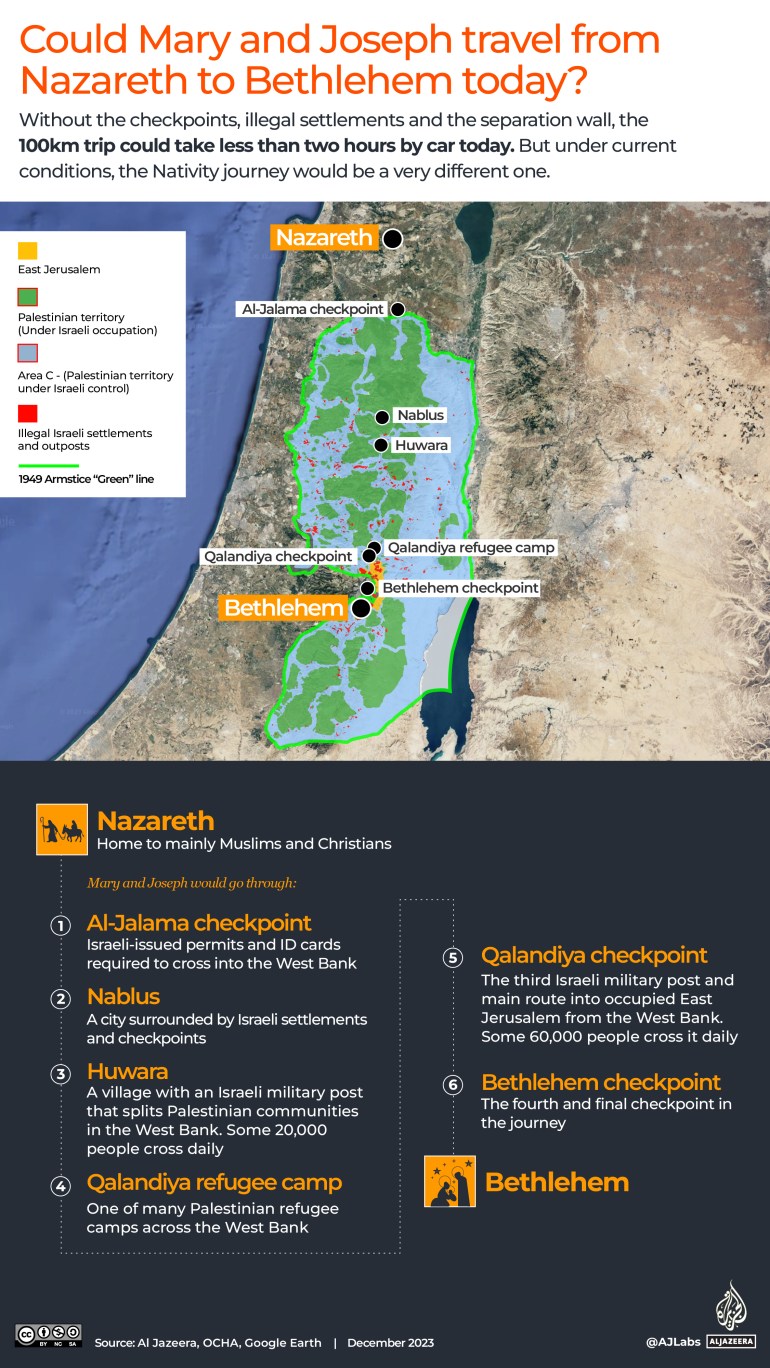
The procession of the patriarchs
One of the most important Christmas rituals in Palestine is the procession of the patriarch from Jerusalem. This procession takes place on December 24 for Catholics and January 6 for Orthodox patriarchs.
The designated procession route that has been followed throughout the Ottoman Empire and the British mandate is now engraved in tradition, Isaac explained. The patriarch is received from Jerusalem in Bethlehem and then the procession walks through the streets of the old town in Bethlehem until it reaches the Church of Nativity, where prayers are held.
Israeli authorities and Palestinian police escort the procession, depending on the territory the procession passes through.

The arrival of the procession is a celebrated festivity, welcomed by several scout groups and musical bands from all over Palestine. People leave their homes to walk around the city and witness the spirit of Christmas.
This year, the bands and scouts will not be present, instead, the procession will be silent.
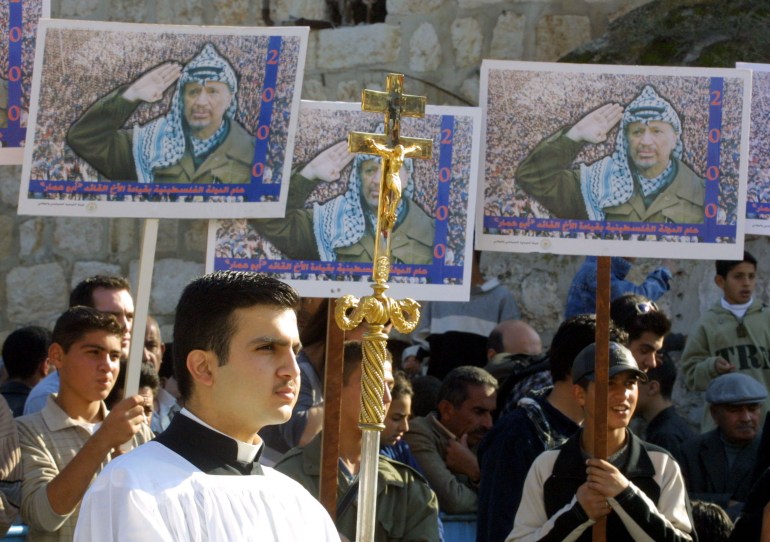
Midnight mass and Manger Square
Once the procession reaches the church, prayers begin at 5pm local time and last until midnight, with the midnight mass being broadcast for the world to see, Raheb said.
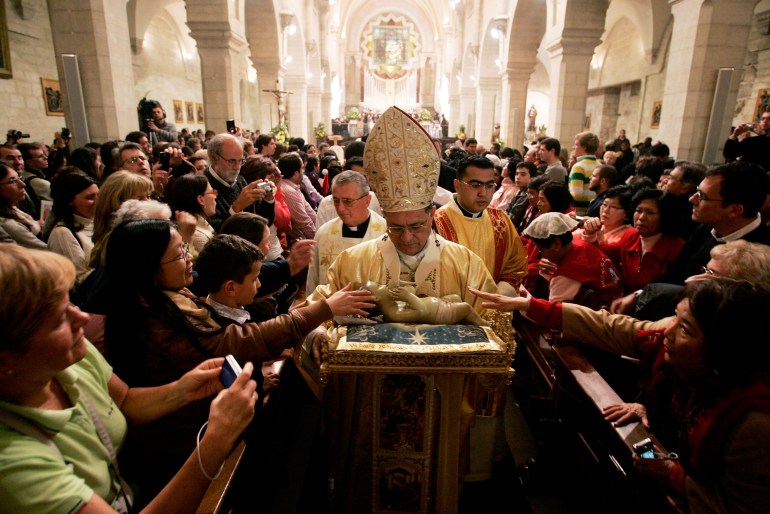
The Manger Square in Bethlehem is also decorated with a large Christmas tree and performances are held there. This year, there is no Christmas tree at Manger Square. Instead, “the civil society and some artists are working on a new kind of crib that is made out of rubble as a sign to what’s happening in Gaza”, said Raheb. He added that a video will be screened on the wall of the Nativity Church, showing what is happening in Gaza.
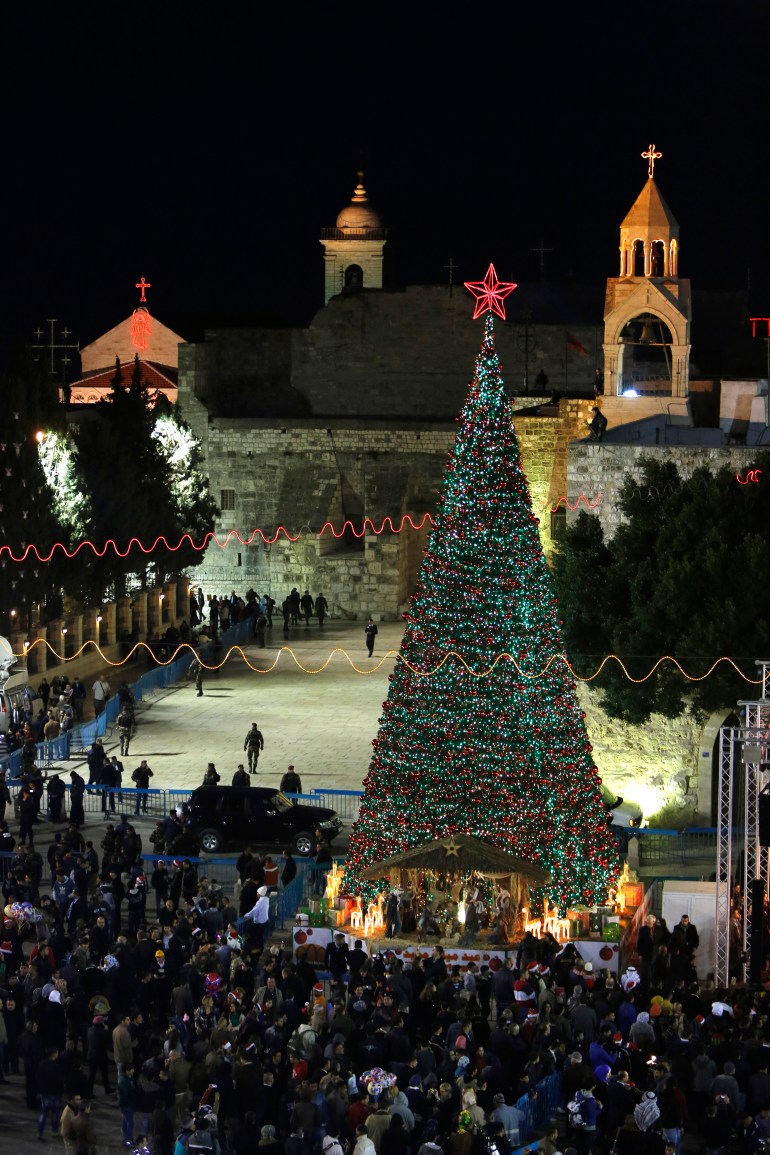
As a child, Isaac would excitedly visit Jerusalem with his parents for Christmas shopping. Several markets sell festive clothes and decorations for the holiday season. It is a tradition to buy the best clothes from Jerusalem and save them for Christmas.
“You know how in America you go to a big mall? We used to go to Jerusalem. We can’t any more,” Isaac said, alluding to the stringent permit rules in the region, which constrict the mobility of Palestinians.
Christmas is a time when families meet, in Palestine and elsewhere. While family could mean a small group of immediate relatives in the West, “When I say ‘family’ in Bethlehem, I say all 200 or so members of the Isaac family in our town – the clan,” said Isaac.
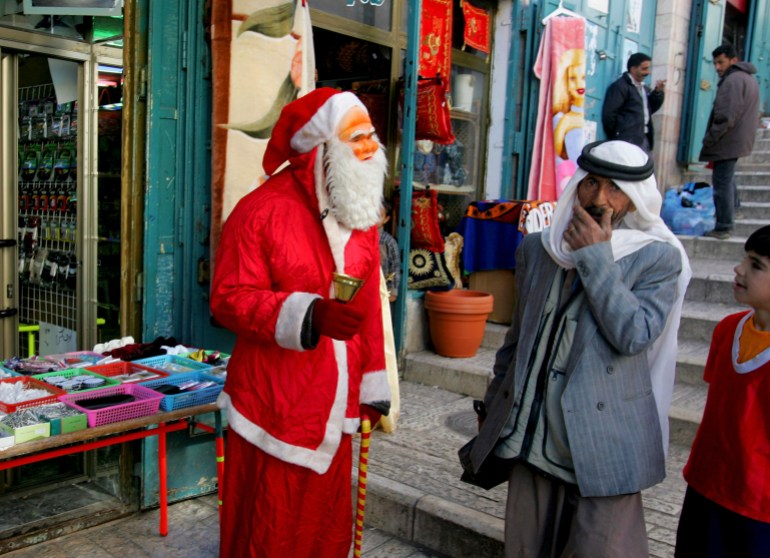
After an initial large gathering of all family members, individual homes are visited. Feasts of rice and meat are enjoyed and homemade desserts and delicacies are exchanged. These include ka’ek, or ma’amoul – semolina shortbread cookies filled with dates or nuts.
Large Christmas trees are a cynosure in every church, where parties and banquets are organised. This year, the parties have been cancelled and “no one is in the mood to … decorate a Christmas tree”, Isaac said.
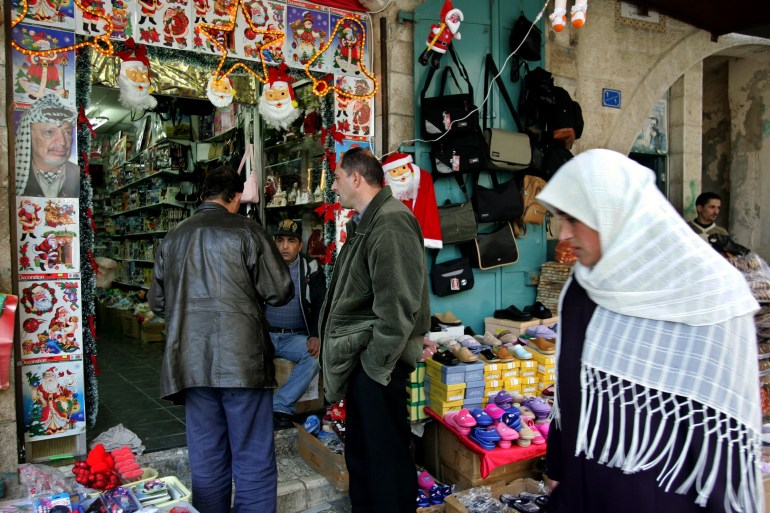
Do Muslims celebrate Christmas in Palestine?
Isaac explained that Christmas is a national holiday for all Palestinians, not just a Christian holiday. The Palestinian Authority considers it a national holiday and government offices are typically closed on Christmas day.
Several Palestinian Muslims visit Bethlehem on Christmas to attend the parade and take pictures with the Christmas tree.
“Jesus was from Bethlehem, after all. And this means a lot to us as Palestinians,” said Isaac.

